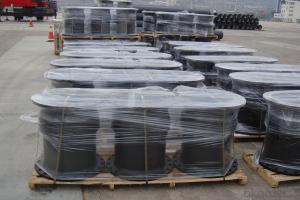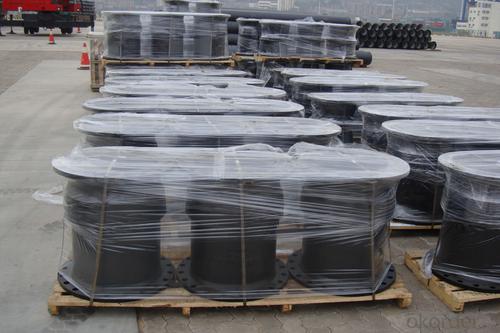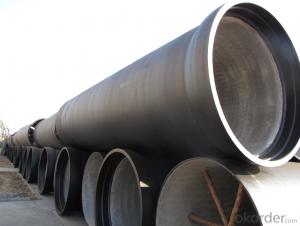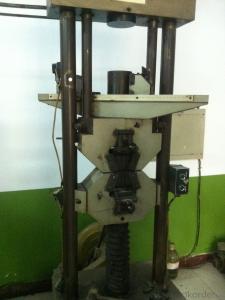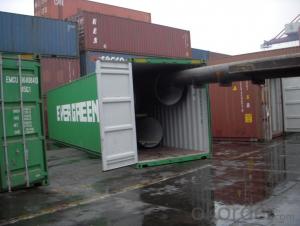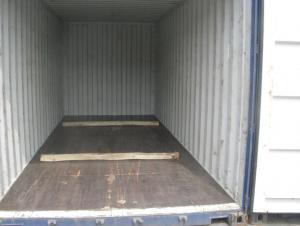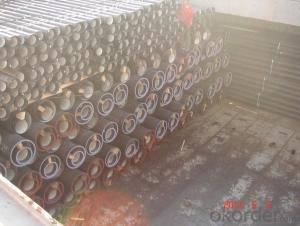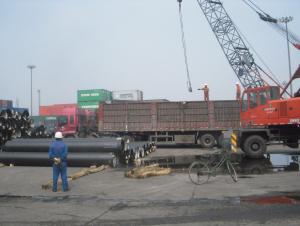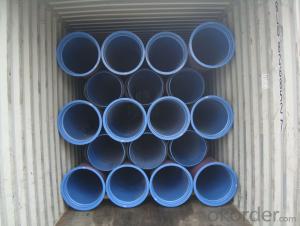DUCTILE IRON PIPES AND PIPE FITTINGS K8 CLASS DN150
- Loading Port:
- Tianjin
- Payment Terms:
- TT OR LC
- Min Order Qty:
- 22 pc
- Supply Capability:
- 3000 pc/month
OKorder Service Pledge
OKorder Financial Service
You Might Also Like
Material : Ductile Cast Iron
Size Range : DN 80mm to DN 2000mm
Unit Effective Length : 6m or 5.7m
Manufacture Standard: ISO 2531:1998/ EN 545:2006/EN 598:2007
Annual capacity : 200,000 tons
Coating Exterior: Zinc 130g/m2 according to ISO 8179-1 and bitumen coating 70 microns.
Cement Interior: Portland Cement/ High Alumina Cement/ Sulphate Resisting Cement Lining according to ISO 4179
Special requirements on external coating and internal lining can be applied
We also provide accessories such as SBR/EPDM rubber gaskets, lubricant paste, pipe caps, PE sleeves, etc.
Additional Parts:
Each pipe is strictly inspected according to related standard to ensure permanently high performance.
Easy Installation at site and service free for life
Long Service Lifespan
Quotation will arrive you within 24hours once we get your inquiry.
We guarantee offering you a competitive price.
A copy of original inspection reports of pipes will be offered after shipment.
Photos of loading process will be sent to the customer after shipment effect.
We will follow-up the delivery progress after shipment effect and update to the customer on weekly basis.
- Q: Are ductile iron pipes suitable for horizontal auger boring installations?
- Horizontal auger boring installations can make use of ductile iron pipes, as they are recognized for their robustness and durability, rendering them a dependable choice for various installation techniques. This particular approach entails drilling a hole horizontally beneath the ground and subsequently inserting the pipe through said hole. Ductile iron pipes possess the capacity to endure the forces involved in this procedure and sustain their structural integrity. Moreover, they exhibit a high level of resistance to corrosion, which proves essential in underground installations, as they may come into contact with moisture and other potentially harmful elements. All in all, ductile iron pipes are a fitting and widely employed alternative for horizontal auger boring installations.
- Q: Can ductile iron pipe be used for hot water applications?
- Yes, ductile iron pipe can be used for hot water applications. Ductile iron pipe is known for its strength, durability, and high resistance to corrosion, which makes it suitable for a wide range of applications, including hot water systems. It can handle high temperatures and pressure, making it a reliable choice for transporting hot water. Additionally, ductile iron pipe's thermal conductivity properties allow for efficient heat transfer, ensuring that hot water is delivered effectively throughout the system. Therefore, when considering materials for hot water applications, ductile iron pipe is a suitable option.
- Q: Does the cast iron pipe need separate corrosion protection?
- Ductile iron is characterized by its ease of decay and deformation, so if it is not a particular requirement, there is no need to do it alone
- Q: Are ductile iron pipes suitable for use in mining tailings pipelines?
- Mining tailings pipelines can utilize ductile iron pipes due to their suitability for this purpose. These pipes possess remarkable strength and durability, enabling them to endure the harsh and abrasive conditions often encountered in mining operations. With their high tensile strength, they can effectively handle the pressure and weight of the tailings material. Furthermore, their resistance to corrosion is crucial in mining environments where the tailings may contain corrosive chemicals or substances. Moreover, ductile iron pipes are known for their ease of installation and maintenance, providing a valuable advantage in time-sensitive mining operations. Ultimately, ductile iron pipes offer a dependable and cost-effective solution for mining tailings pipelines.
- Q: How are ductile iron pipes connected or jointed together?
- Ductile iron pipes are typically connected or jointed together using various methods such as flanged joints, push-on joints, mechanical joints, or restrained joints. These methods ensure a secure and leak-free connection between the pipes, providing a reliable and durable pipeline system.
- Q: Ductile iron pipes lined with cement mortar in the water (living water, water in the 6.9-7.3) in the early pH, why pH increased? How to solve this problem?
- 1, because of the bone in mortar, such as silicate products, there will be silicification reaction, in addition, there is the reaction of limestone in lime.2, cement mortar lining cover coating, that is, spray some paint! Some questions four are unavoidable
- Q: Do rigid cement cast iron pipes need cement piers?
- Ductile weakness: ductile cast iron pipes connected by human factors such as the operation level of responsibility, influence, construction not convenient. The advantages of PE PE PE pipe has good corrosion resistance and its anti inorganic performance than that of the metal pipe is much stronger in the buried without corrosion, construction convenient. Small diameter PE pipe in the price performance ratio is better than that of steel and ductile iron.PE tube have disadvantages: benzene, gasoline, carbon tetrachloride and other organic solvents have certain effect on pe. If the organic solvent is infiltrated into the polyethylene, the swelling will occur, and its physical properties will be decreased. Its pressure resistance and temperature resistance are poor.
- Q: Are ductile iron pipes suitable for wastewater treatment plants?
- Ductile iron pipes are highly suitable for wastewater treatment plants. They possess exceptional strength and durability, making them resistant to corrosion. Consequently, these pipes are an excellent choice for managing wastewater, which often contains corrosive elements. Moreover, ductile iron pipes boast remarkable tensile strength and can endure high pressure, critical for the transportation of wastewater in treatment plants. The flexibility of these pipes also permits easy installation and maintenance, ultimately reducing both cost and time required for wastewater treatment plants. In summary, ductile iron pipes are extensively utilized in wastewater treatment plants due to their durability, resistance to corrosion, and their ability to handle the challenging conditions present in such facilities.
- Q: How much is the manual installation fee of ductile iron pipes from 100 to 150 per metre?
- According to the various connection modes after the installation of artificial fee at =8.7~9.0 yuan (about /M this is pure artificial installation fee, no other costs to calculate, if packet labor costs and construction should be appropriately increased when installed).
- Q: Are ductile iron pipes suitable for use in oil refineries?
- Yes, ductile iron pipes are suitable for use in oil refineries. Ductile iron is a type of cast iron that offers a unique combination of strength, durability, and flexibility, making it an excellent choice for various applications, including oil refineries. One of the key advantages of ductile iron pipes is their high tensile strength, allowing them to withstand the high pressure and stress commonly found in oil refining processes. This strength is crucial for the transportation of various fluids, including crude oil, refined petroleum products, and chemicals within the refinery. Additionally, ductile iron pipes have excellent corrosion resistance properties, making them highly resistant to the corrosive effects of oil, chemicals, and other substances typically present in oil refineries. This corrosion resistance ensures the longevity and reliability of the pipes, reducing the need for frequent maintenance and replacement. Furthermore, ductile iron pipes have exceptional ductility, which means they can absorb and withstand significant impacts and vibrations without fracturing or breaking. This quality is advantageous in oil refineries where there may be frequent movement or potential stressors due to machinery, equipment, or ground settlement. Moreover, ductile iron pipes have a smooth interior surface that reduces friction, allowing for efficient fluid flow and minimizing pressure loss. This characteristic is essential in oil refineries, as it helps optimize the transportation of fluids, ensuring a smooth and reliable production process. In conclusion, ductile iron pipes are suitable for use in oil refineries due to their high tensile strength, corrosion resistance, ductility, and smooth interior surface. These pipes provide a reliable and durable solution for transporting various fluids within the refinery, contributing to the efficient and safe operation of oil refining processes.
Send your message to us
DUCTILE IRON PIPES AND PIPE FITTINGS K8 CLASS DN150
- Loading Port:
- Tianjin
- Payment Terms:
- TT OR LC
- Min Order Qty:
- 22 pc
- Supply Capability:
- 3000 pc/month
OKorder Service Pledge
OKorder Financial Service
Similar products
Hot products
Hot Searches
Related keywords
